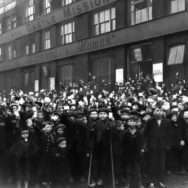The Influence of the Sunday Schools on the Ragged School Movement by D. H. Webster
When Robert Raikes lamented the plight of the poor in Gloucestershire an inhabitant said to him: “Ah sir, on Sunday these wretches spend their time in noise and riot, playing at ’chuck’ and cursing and swearing in a manner so horrid as to convey to any serious mind an idea of hell.” [1. B.Rodgers, The Cloak of Charity. 1949, p.101] Read more…







